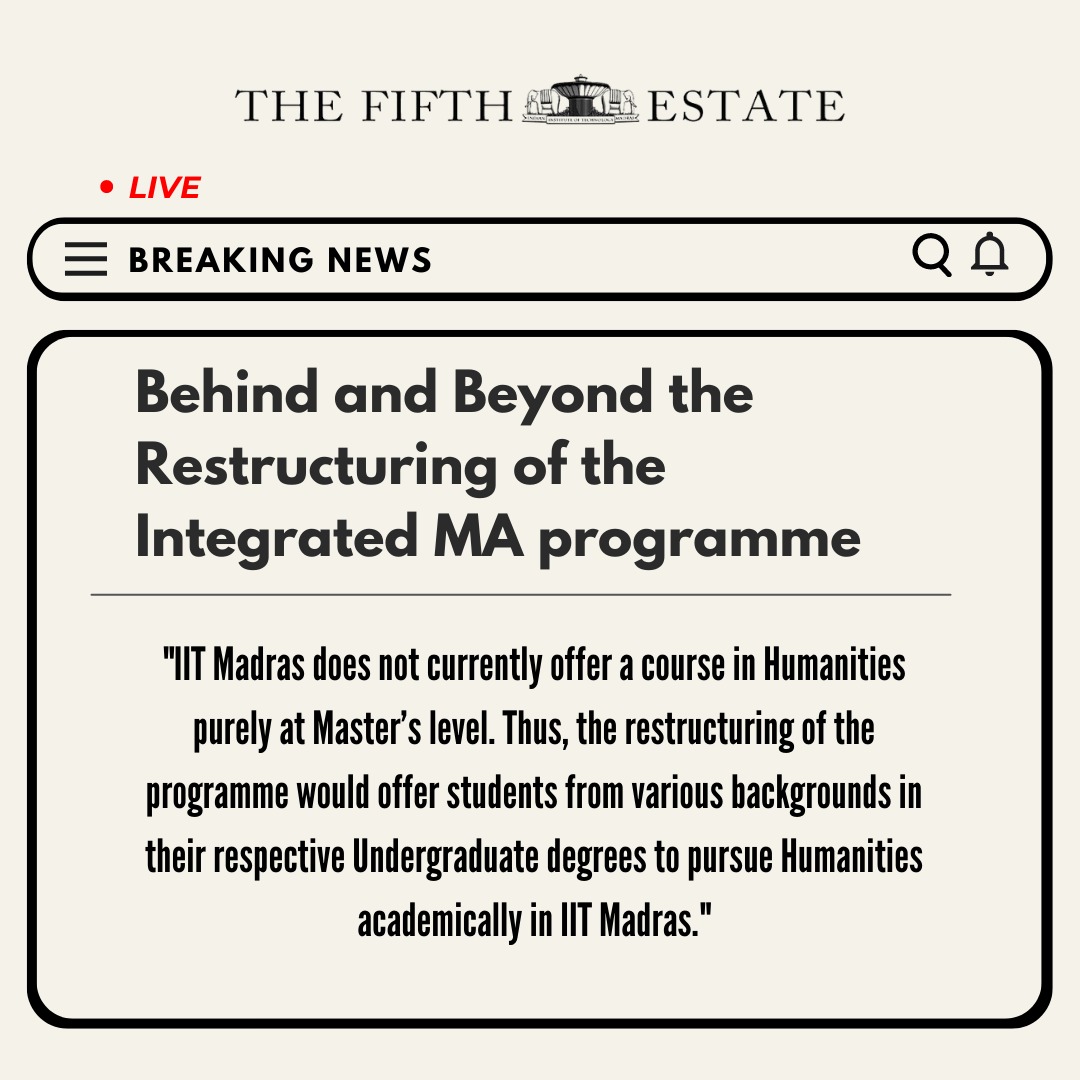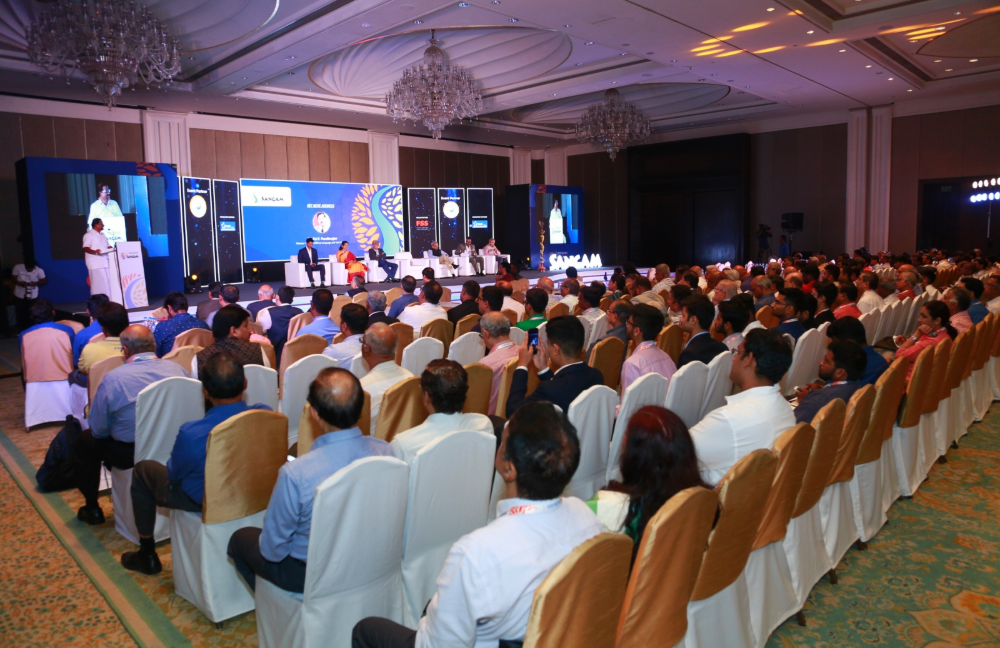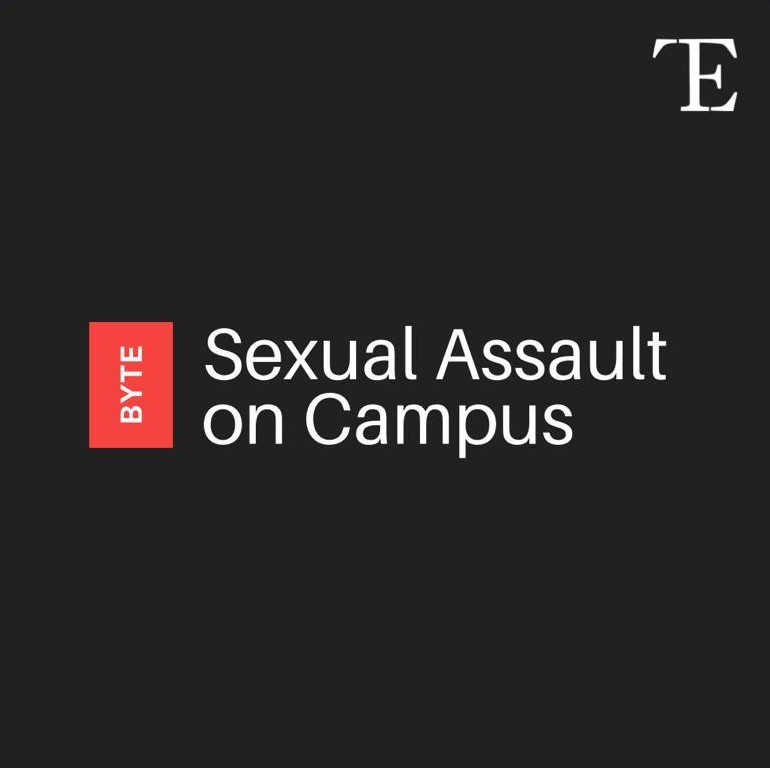“MA in an IIT?”
“An undergrad degree in humanities?”
“Hmm, wait what?”
“Yes, in IIT Madras.”
“In IITM? You’ve got to be kidding me!”
That is a general trajectory of the conversation that occurs (at least mentally, if they happen to be polite) when people first discover about the 5-year Integrated MA programme at IIT Madras. But no more! As most of the student body would know by now, the Integrated MA programme is set to be restructured as a 2-year MA programme from the year 2023, making the incoming MA batch of the year 2022 the last one under the Integrated Programme.
First off, what exactly is the Integrated MA programme?
In 2006, IIT Madras started a five-year integrated MA programme in the Department of Humanities and Social Sciences. Under this programme, students could study for five years to directly graduate with an MA degree instead of doing a BA and an MA separately. It is a multidisciplinary programme with courses spanning various humanities-affiliated disciplines including, but not limited to, history, economics, cultural studies, anthropology, linguistics, language and so on. The first two years of the programme are similar to a liberal arts programme after which the students can specialise in either English Studies (ES) or Developmental Studies (DS).
How is the programme being restructured?
From the year 2023, the incoming batches will have to appear for an HSEE-equivalent entrance exam. It is a purely post-graduate programme that will only be open to those students who hold a Bachelor’s degree. In addition to ES and DS, the students under the new programme will also be offered an MA degree in Economics.
As of 2022, the intake of the integrated MA programme is 58 students. The restructuring will increase this input to 75 students – 25 students across the three streams.
What does this mean for the current students in the programme?
The current students in the integrated programme will not be affected by the restructuring and will continue to study and complete their degrees here. In addition, they can also take up the courses and electives offered to the students of the Master’s programme. The 5th-year students will continue to receive the HTTA stipends as per the previous rules and conditions. The administration has assured the students that their placement prospects won’t be hampered as the companies will be briefed about the restructuring in advance.
The courses common for the students of both the programmes will temporarily run on an extended capacity. This will not adversely affect the students’ grades as it will be just like the electives which host the students spanning across the branches and batches, according to the administration.
What do the current students think about the restructuring?
The MA students feel that the current programme offers a unique interdisciplinary perspective which allows for the exploration of diverse academic and non-academic interests. They also feel that the richness of the subjects may not be able to be encompassed in just two years. But they also point out the drawbacks of the current course such as the abstract nature of the course. Most of the students welcome the introduction of a separate Economics stream. A student mentioned that the new programme will bring a diaspora of voices and opinions owing to their UG experience in diverse fields.
Some B.Tech students expressed their view that the longer duration of the programme allowed them to bond with the MA students enabling an exchange of perspectives quite rarely found otherwise. There are also concerns that restructuring the programme would further isolate the Department of Humanities and Social Sciences from the rest of the technical departments.
To quote some of the students:
“But what I do know is that being in a techie-hs coexisting space is a very good replica of the actual society. It mutually benefits both the course students I think.”
“It has its own advantages and disadvantages. While it is true that the perspectives of the new students would be different, owing to their UG experience from totally diverse fields, it also holds that the richness and variety of the course cannot be covered in just 2 years.”
“I feel it’s a good programme and important to the cultural fabric of insti. Having undergrad students of the humanities on campus makes it a better experience, in my opinion. I don’t really like the fact that it is getting restructured in favour of the new programme. I feel that this will further remove the HS department from the “rest” of insti rather than all the departments feeling fully integrated.”
“I think it (the existing integrated programme) is a unique programme which helps the students explore their interests in many fields.”
The MA students have also expressed sadness over the fact that they only got to know about such a move through social media meme pages. Furthermore, the administration took several days to officially address the students about the restructuring of the programme and their concerns regarding the same.
What other impacts would the restructuring of the programme have?
The current programme is an integrated programme which offers a base of Liberal Arts education before the students can specialise in one of the two offered fields. The scope of this programme is very diverse though not in-depth. Thus, it equips the students more for the pursuit of academia than a career path with traditional placements and jobs. The presence of such a programme in a leading technical institution offers both the technical as well as the humanities students a unique academic outlook and learning experience. It also enhances the diversity of peer interactions. Thus, such a restructuring of the programme will affect all of these, leaving the undergraduate technical students with essentially no opportunity for interaction with peers from the humanities. It will also be a blow to the academic-oriented Liberal Arts education in the country.
On the other hand, IIT Madras does not currently offer a course in Humanities purely at Master’s level. Thus, the restructuring of the programme would offer students from various backgrounds in their respective Undergraduate degrees to pursue Humanities academically at IIT Madras.
What is the administration’s rationale behind this action?
The Director mentioned in an interview regarding the same that, “Such type of humanities and social science exposure is very much needed for the next generations of students to face and address different challenges posed by the modern world. This expanded list of M.A. programmes will open new avenues for placement and employability as the students will be trained as domain-specific experts with international readiness and national focus.”
Garima is a professional forgetter and aspires to be a Frooti.





